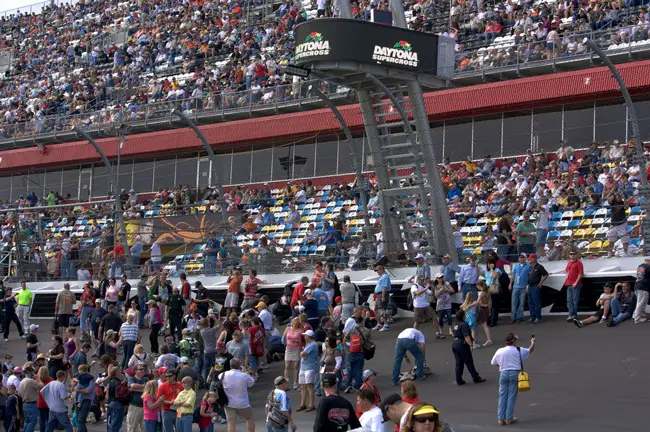
Daytona International Speedway and the Miami Dolphins, both unsuccessful in getting money out of Florida lawmakers in recent years, were the first to sign up for the state’s new stadium-funding process.
An application is also expected from Jacksonville seeking to recoup some of the $100 million the city and the Jacksonville Jaguars are using for improvements to the city-owned EverBank Field.
The deadline to apply for the new annual funding process is Saturday.
The process was created by lawmakers this spring in an attempt to reduce lobbying for stadium subsidies by setting up a business incentive program.
The new law (HB 7095) requires the Department of Economic Opportunity to evaluate each application within 60 days and by Feb. 1 provide the Legislature with a list that ranks the applications based upon economic viability.
In signing the bill into law in June, Gov. Rick Scott called it a job creator that will increase tourism and “allow franchises to expand in Florida.”
Dolphins owner Stephen Ross and Jaguars owner Shahid “Shad” Khan have been big supporters of Scott’s re-election.
Opponents of the law argued that the process will only make it easier for communities and teams to get state money.
The Legislature agreed to set aside up to $13 million a year for stadium work.
The law allows projects that cost more than $200 million to apply for up to $3 million a year in funding. Projects worth between $100 million and $200 million could apply for up to $2 million a year, and those between $30 million and $100 million would be eligible for up to $1 million a year. Each funding allocation would be for 30 years.
The Jacksonville City Council approved a resolution Tuesday in support of an application that will seek $2 million a year through state sales taxes generated at the facility. The stadium is leased by the National Football League team.
The upgrades at the field include an elevated interactive fan area beyond the north end zone and a pair of massive scoreboards — 60 feet high, 362 feet long — that are billed as the world’s largest.
Both the Dolphins and Daytona International Speedway are seeking $90 million in state sales-tax dollars that would be paid out over three decades.
Ross announced in June he would self-fund most of a $350 million project to modernize the Dolphin’s 27-year-old Sun Life Stadium. The announcement helped him win support from the Miami-Dade Commission on a deal in which the local government agreed to pay the Dolphins tourist development money when a major sporting event, such as a Super Bowl or international soccer match, is held at the stadium.
The local deal, which requires Ross to keep paying property taxes on the stadium, caps the event payments at $5 million a year.
The speedway, which submitted its application at the start of October, has undertaken a $400 million project. Called “Daytona Rising,” the work includes new entrances, expanded entertainment concourses, increased refreshment and concession areas and wider seating. It is expected to be completed by January 2016.
“When you pull everything together it truly shows you how significant Daytona International Speedway is to this community and to Central Florida, and it only justifies the investment we’re making,” Joie Chitwood, the speedway’s president, told The Daytona Beach News-Journal when the application was filed.
A controversy involving Ross during and after the 2013 legislative session played a role in setting up the new law and in lawmakers rejecting funding requests in both 2013 and 2014 for the Daytona speedway, EverBank Field and soccer stadiums in Orlando and Miami.
The law requires each recipient to provide the state agency a report every five years showing that it is meeting set program requirements. However, the law only states that if the recipient isn’t meeting the set goals, the agency will recommend some unspecified future action to the governor and Legislature.
The new law also expands who can be eligible for sales-tax dollars for stadium work from just Major League Baseball, the National Hockey League, the National Football League and the National Basketball Association to now include Major League Soccer, the North American Soccer League, NASCAR, the Professional Rodeo Cowboys Association, hosts of the Breeders’ Cup horse races and minor-league baseball facilities.
–Jim Turner, News Service of Florida





























Michael Randazzo says
So what’s your point? DIS is putting thousands to work on the construction of the $400 million expansion (all private funds not a penny of public financing or funds) and that isn’t just the speedway, across the street they will be building hotels, entertainment centers, shopping malls and the like. For all this they are asking a $3 million a year grant? I don’t know, how many millions in taxes will all the employees in all these ventures be paying in sales tax and other taxes? I bet it’s more then $3 million a lot more. I think it’s fair.
gadfly says
It’s a win-win for everybody.They pump tens of millions of dollars into the local economies. Those tax breaks are a very small price to pay.
confidential says
Oh yeah, give more to the already super wealthy and denied the services that we pay for in our taxes to the middle class and the poor. Also keep refusing to accept the Feds Medicaid for the unemployed and needy that we already pay upfront in our taxes to Washington.
No wonder blight keeps taking over all around us.
Groot says
Why give a perennially bad NFL team that plays part of it’s home games in London a tax break in this state?
The writing is on the wall, the NFL wants this team in London, not here. Let London give them a tax break.